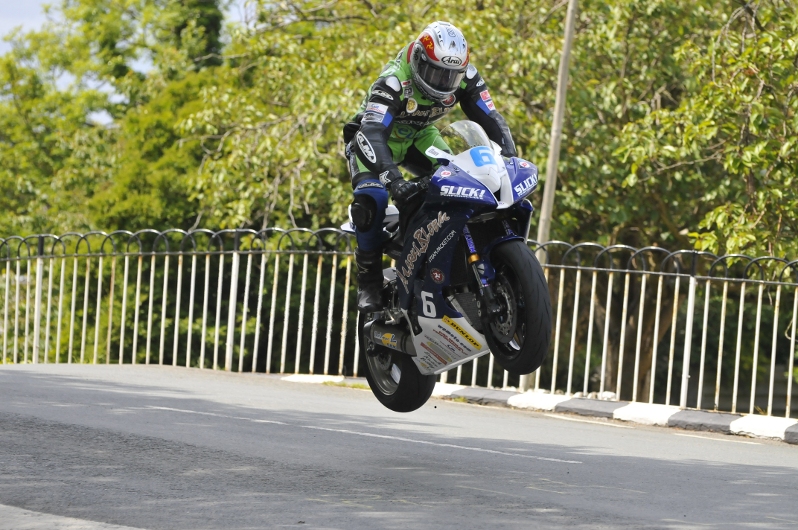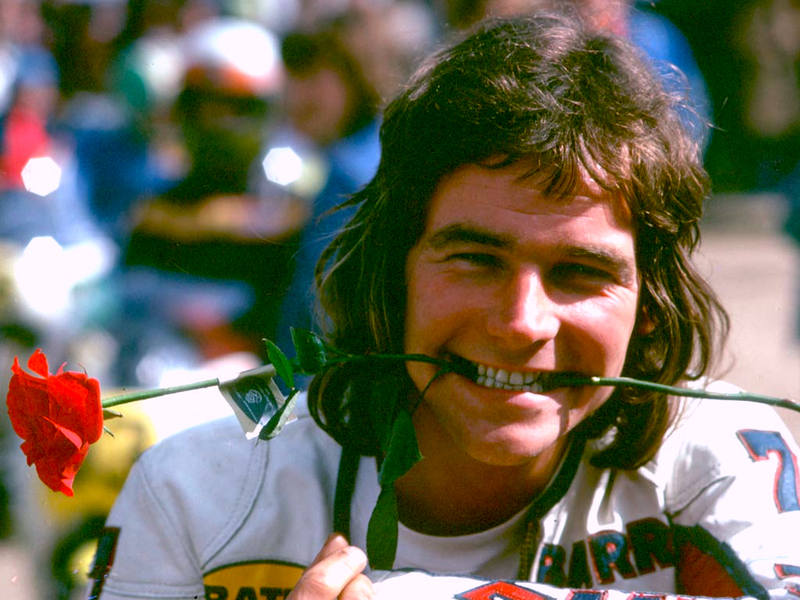Motorcycle Hero: Barry Sheene
life in the fast lane but with a safety legacy for all
One of the great motorcycle legends of all time, Barry Sheene, not only thrilled the crowds in his racing career but left a lasting legacy to benefit motorcyclists down the generations which not many people know about. He invented the back protector for motorcycle racers.
As a boy Barry Sheene was not top of the class at school and had had enough of school altogether by the age of fifteen, leaving with no qualifications. However he had plenty of strings to his bow and joined his father who had a workshop where he tuned motorcycles, providing a motorcycle racing environment in which the young Barry felt much more at home than school. At seventeen Sheene was already test riding his father's motorcycles and his great natural ability for speed became apparent straight away. He rapidly progressed from testing to motorcycle racing and immediately started winning races.
In 1970 Sheene bought an ex works Suzuki 125 and came a close second in the 1971 125cc World championship. This was a great result for a privateer up against the factory teams and got him a ride as works rider for Yamaha which unfortunately did not work out too well for him. Subsequently he became works rider for Suzuki in 1973 and in this year proved himself by winning the F750 championship.
I get knocked down, but I get up again
From then on it was a trip to the stars for Sheene, with the unlikely help of a dramatic accident in 1975 at Daytona Speedway. Film of his 180mph crash was broadcast around the world to gasps of horror. It looked as though no one could have survived a crash like that, but he did and despite his injuries was back racing within six weeks much to his fans delight. Sheene had a cheerful positive approach to life despite the extreme danger of his chosen profession and this was very apparent in a film about him by Frank Cvitanovich, made at the time of the Daytona crash. In the film Sheene appeared full of self belief and confident of his success making him very appealing. Sheene's spectacular crash and phoenix like rise to race again within six weeks inspired the public who took him to their hearts. He began to appear on TV regularly and was sought after for adverts (remember - 'Nothing beats the great smell of Brut') and chat shows. He presented himself as a playboy, but in reality was dedicated to his long term partner Stephanie McLean who he eventually married and had two children with.
His racing continued on an upward trajectory and in 1976 and 1977 he became Blue Riband 500cc motorcycle road racing champion twice.
Safe and sound
Motorcycle racing at that time was extremely dangerous, more so than it is today. The bikes themselves were very difficult to ride and prone to seizing and engine failure and the race circuits had no safety measures in place. Sheene, having been a victim of terrible crashes himself was very concerned to improve conditions and safety for other riders. He was openly critical of circuits like the Imatra circuit in Finland, which was mainly a track on public roads, and involved riders riding over hazards like a railway crossing at high speed. As well as criticising unsafe circuits Sheene also invented the very first body armour back protector for motorcycle racers which he made from old helmet visors – it was such a good new idea that Dainese bought the concept in 1977 and body armour has gone from strength to strength since Sheene's first great idea. A legacy which has saved many a rider since from serious injury.

Racing today - Dan Kneen
Although a serious contender Sheene did not win again for several years after 1977, something which he put down to a viral illness which put him off his stroke and by the late 1970s a new generation of talented American riders were on the scene as challengers.
By 1982 he had a good enough ride with Yamaha to put the world championship in his sights but then suffered a horrific crash when he rode into a fallen machine at 165 mph, almost died and had his legs nearly severed. His legs were rebuilt using metal plates and screws and, true to form, he announced that in spite of his injuries he would race again! However despite his personal confidence he never got works bikes again.
He carried on undaunted on privateer bikes and made some amazing rides including a great third place in the South African Grand Prix on an under-powered bike with mechanical problems.
Since his day, race circuits have become safer and slower – his average speed in the 1977 Belgian Grand Prix was a staggering 135 mph.
Rest and recuperation
Retiring to Australia with his family in 1980, and after a long rest from competitive racing, he couldn't resist in 1998 beginning to race classic machines on which he raced extremely competitively beating many riders far younger than himself. Sadly in 2002 he was diagnosed with cancer of the oesophagus and upper stomach. He refused conventional treatment and in September 2002 he won the last race he rode. He died at home in Queensland, Australia, on 10 March 2003.
Leaving a legacy of increased safety for motorcycle racers who came after him, including body armour which has today saved many lives, the indomitable cheerful spirit, fantastic racing speed and real courage of Barry Sheene will never be forgotten.
Others from the Motorcycle Heroes series



